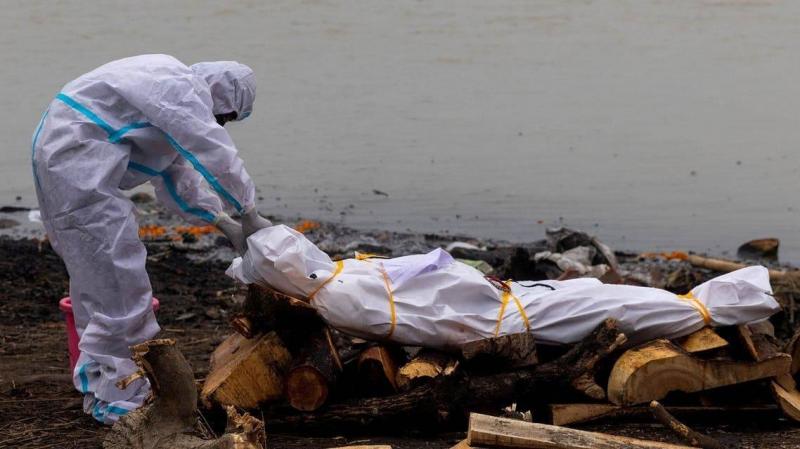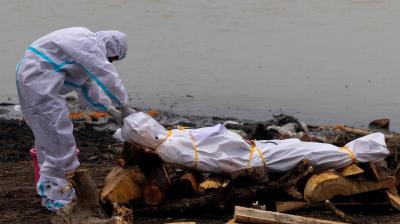The government of Uttar Pradesh in northern India announced in a message reviewed by Reuters that bodies of COVID-19 victims have been found discarded in some Indian rivers, marking the first official acknowledgment of a troubling practice that it claims may be due to poverty and fear of the disease in villages. The death toll from the virus has reached 270,284, while there has been a significant rise in infections. Photos of bodies swept away in the sacred Ganges River shocked a nation grappling with the worst surge in COVID-19 cases globally.
On Sunday, the number of confirmed COVID-19 cases in India reached approximately 24.7 million, with 311,170 new cases reported in the last 24 hours, while deaths increased by 4,077. Data from the Ministry of Health indicates that the total number of infections in India is now 24.68 million, with 270,284 deaths.
Despite media links between the recent increase in the number of bodies and the pandemic, Uttar Pradesh, which has a population of 240 million, has not publicly disclosed the cause of the deaths. Manoj Kumar Singh, a senior official in the state, stated in a message on May 14 to district heads that the administration has information indicating that bodies of those who died from COVID-19 or other diseases are being thrown into rivers instead of being disposed of according to proper rituals. He added, "As a result, bodies have been recovered from rivers in many areas."
Prime Minister Narendra Modi urged officials on Saturday to enhance rural healthcare resources and follow up as the virus rapidly spreads in those regions, following its invasion of cities. Singh mentioned that among the potential reasons for disposing of bodies in rivers are a lack of funds to purchase materials such as firewood for cremations, religious beliefs in some communities, and families disposing of victims out of fear of the disease. He instructed village officials to ensure that no bodies are thrown into rivers, asserting that the state government would pay 5,000 rupees (68 dollars) to poor families for cremating or burying the deceased. The state has also requested police to patrol rivers to stop this practice.
Meanwhile, the heavily pandemic-stricken state of West Bengal has imposed a two-week lockdown starting Saturday in an attempt to curb the spread of infections after large electoral rallies in April. All offices, shops, and public transport will be closed for two weeks in this northeastern Indian state, which has reported a record number of cases and deaths. Bengal recorded 21,000 new cases out of the 326,000 total reported across India on Saturday. Hospitals are overwhelmed, with this state and others in southern India particularly affected by the pandemic in a country that has reported 25 million cases and 265,000 deaths.
The main opposition party in the southwestern state of Goa has confirmed that over 70 people died in five days due to a lack of oxygen in hospitals, while the government stated that the cause of death had not been identified. A court has ordered urgent oxygen supply to the Goa Medical College to prevent further deaths. Authorities in Goa are requesting the central government to double the oxygen supply to 40 tons daily. The massive second wave of infections in India began in February, increasing pressure on hospitals and medical staff.
In states like Maharashtra and northern Delhi, which initially faced a surge in infections, cases have steadily decreased after strict lockdown measures were imposed. Federal health officials confirmed on Saturday that the overall positive rate for tests decreased to 19.8% last week after being 21.9% the previous week, raising hopes that daily infections may be stabilizing. However, increases have been reported in states like Tamil Nadu in the south and in rural areas.




